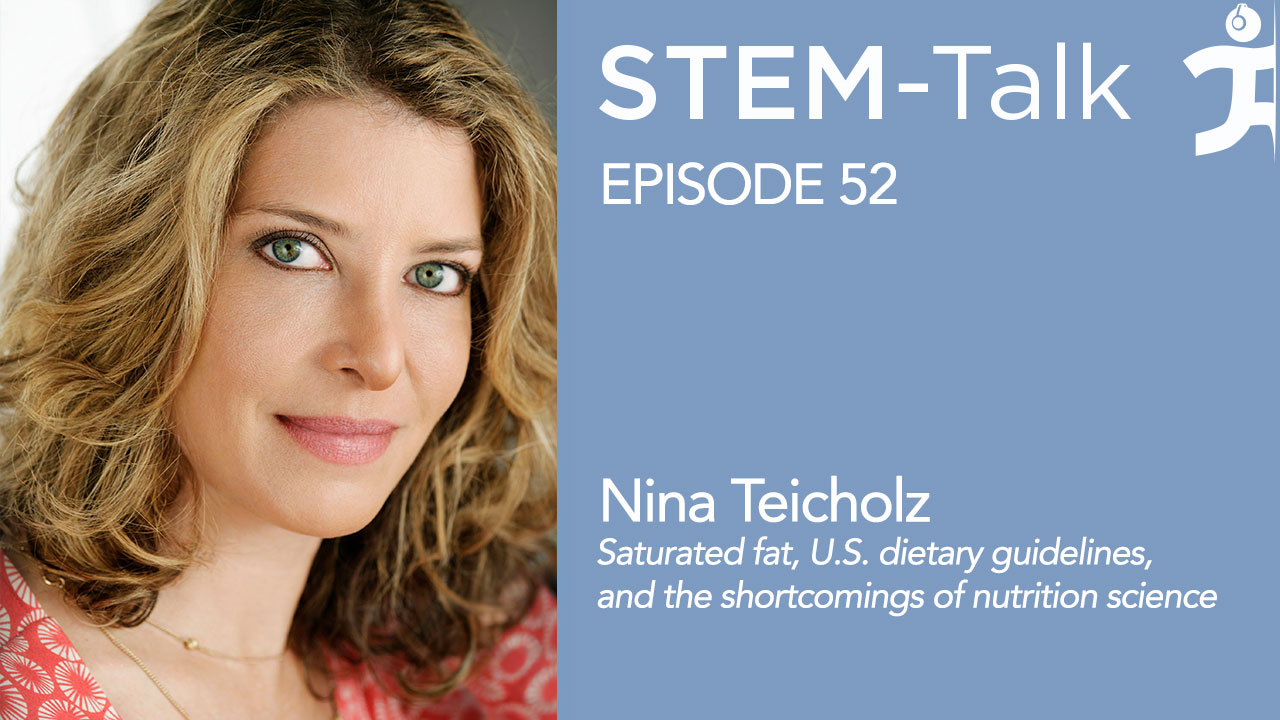STEM-Talk
Episode 52: Nina Teicholz on saturated fat, U.S. dietary guidelines, and the shortcomings of nutrition science
// Dec 5, 2017

Investigative journalist Nina Teicholz joined Ken and Dawn remotely from a studio in New York City in mid-September for a fascinating discussion about the history and pitfalls of nutrition science.
Teicholz is the author of the international bestseller, “The Big Fat Surprise: Why Butter, Meat & Cheese Belong in a Healthy Diet.”
The Economist named it the number one science book of 2014 and the Journal of Clinical Nutrition wrote, “This book should be read by every scientist and every nutritional science professional.”
Nina began her journalism career as a reporter for National Public Radio. She went on to write for many publications, including the Wall Street Journal, New York Times, Washington Post, The New Yorker, and The Economist. She attended Yale University and Stanford University where she studied biology and majored in American Studies. She has a master’s degree from Oxford University and served as associate director of the Center for Globalization and Sustainable Development at Columbia University.
“The Big Fat Surprise” is credited with upending the conventional wisdom on dietary fat. It challenged the very core of America’s nutrition policy by explaining the politics, personalities, and history of how we came to believe that dietary fat is bad for health. Her book was the first mainstream publication to make the full argument for why saturated fats – the kind found in dairy, meat and eggs – belong in a healthy diet.
The Wall Street Journal, Forbes, Mother Jones, the Library Journal and Kirkus Review named “The Big Fat Surprise” one of the best books of 2014. The Economist described Nina’s book as a “nutrition thriller.”
Links:
— Amazon: “Big Fat Surprise” http://amzn.to/2iQemXc
— BMJ: “The scientific report guiding the US dietary guidelines: is it scientific?”
— “A Review of the Dietary Guidelines by the National Academy of Medicine”
— “Statistical Review of US Macronutrient Consumption date, 1965-2011”
— “What if Bad Fat is Actually Good for You?”
Show notes:
4:10: Interview begins with Nina talking about how her father, an engineer who also enjoyed computer science, sparked her interest in science.
5:41: Dawn asks Nina if she would share the story about her failed fruit-fly experiment in high school.
8:07: Nina talks about how an assignment to do a story on trans fats led her to become friends with journalist Gary Taubes, the author of “Good Calories, Bad Calories,” whom Dawn and Ken interviewed on episode 37 of STEM-Talk.
11:40: Dawn talks about an article Nina wrote for Men’s Health Magazine titled, “What If Bad Fat Is Actually Good for You?” It’s the article where Nina first laid out her case that saturated fats may not be bad for people’s health and might actually be good for people. Dawn asks Nina if she got pushback on that article.
14:07: Dawn asks about a paper Nina published in BMJ titled, “The Scientific Report Guiding the US Dietary Guidelines: Is It Scientific?” Dawn asks Nina to describe what happened when 180 scientists wrote a letter asking BMJ to retract the paper.
19:52: Dawn comments about how the pushback to the article seemed to violate the very process that science is supposed to follow.
21:30: Ken comments about the orchestrated effort to make Nina look bad, which leads Nina to highlight the support she received from BMJ and its editor Fiona Godlee.
22:55: Nina talks about the difficulty a journalist faces when challenging the work of scientists from institutions like Harvard and Yale.
24:16: Ken mentions how we’re seeing more and more dogma dressed up as science, which that leads to a discussion between Ken, Dawn and Nina about the shortcomings of nutrition science.
30:32: Dawn comments that Nina has been quoted as saying that institutionalized science is an oxymoron, and once institutions started adopting the principle that saturated fat caused heart disease, the scientists who knew better were silenced. Dawn asks Nina to expand on this.
35:42: STEM-Talk blurb.
36:12: Nina talks about a review of the dietary guidelines by the National Academy of Medicine that came out just the day before her interview with Ken and Dawn in September. The report concluded that the scientific rigor used for the dietary guidelines was not up to par.
39:05: With a population that is genetically and environmentally diverse, and in the current age of information where individuals can increasingly access data to personalize their own approach to health, Ken asks Nina if there is still an important role for a standardized set of national dietary guidelines?
40:52: Ken comments that he doesn’t really want the government telling him what to eat or what color to paint his house, and Nina responds that at the very least the government should stop making Americans fat and sick.
41:47: Nina comments that we don’t really know what kind of diet is optimal for the longest life, which leads to a discussion about the zealotry of dietary activists.
43:46: Dawn references a 2015 a paper titled, “Statistical Review of US Macronutrient Consumption Data, 1965–2011: Americans Have Been Following Dietary Guidelines, Coincident With the Rise in Obesity.” The paper was based partly on Nina’s work, and Dawn asks Nina how the study come about.
45:11: The title of the paper suggested that there was a connection between the dietary guidelines and obesity rates, and a back-and-forth conversation ensues between Ken, Nina and Dawn about whether it is possible to determine that.
48:11: Ken comments that the study found the total amount of fat in the diet did not significantly decrease between 1971 and 2011, but the percentage of fat decreased due to an increase in total carbohydrates, as well as total calories. Ken asks Nina if she thinks we can differentiate an effect of the carbohydrates in the diet from this data, or could the problem just be total calories?
49:62: Ken agrees with Nina on the benefits of a low-carb diet and points out that the National Health and Nutrition Examination Survey (NHANES) data used in the 2015 study have been questioned by many researchers, with some saying that the majority of participants under-reported many hundreds of calories per day. And since we don’t know what was in those missing calories, Ken wonders if we still can make inferences between population macronutrient intake and overall health?
51:07: Dawn asks Nina about Dr. Tim Noakes of South Africa, who faced a hearing in front of the Health Professions Council of South Africa after a complaint filed by the Association for Dietetics in South Africa. The organization reported Noakes for advising a mother on Twitter that she wean her child onto low-carb, high-fat foods, which Noakes described as real food.
56:04: Ken asks Nina about hecklers at conferences, social media trolling, and all manner of other bullying that is aimed at her and people like Tim Noakes.
57:09: Ken comments there seems to be an unhealthy and largely opaque intersection of money, industry influence, government grants, politics, and national nutrition policy. Ken asks, “How and why did this happen?”
59:50: Dawn comments that when the low-fat diet was officially recommended to the American public in 1961, just one in seven Americans were obese. Today, it’s one in three. It’s interesting that we started the low-fat initiative in an effort to reduce heart disease. But 40 years later, heart disease remains the leading cause of death for both men and women. Dawn asks Nina if she see any signs that the American Heart Association will revisit their recommendations?
1:02:17: Ken observes that the American Diabetes Association also seems to provide poor dietary advice. He points out that a pundit once observed that the Center for Science in the Public Interest is an organization that is neither science, nor in the public interest.
1:05:19: In speaking of a post-factual world driven by unsupported assertions and appeals to emotion, Dawn asks Nina to talk about the documentary, “What the Health.”
1:10:19: Dawn mentions how we’re seeing so many children becoming obese early in life and wonders if it could be a blend between epigenetic effects from previous generations and current food options. Dawn asks Nina if she thinks we are digging ourselves into a hole that will be tough to get out of healthwise as a population?
1:13:29: As we learn more about the gut microbiome, and how it plays a substantial role in our overall health and cognitive state, Dawn asks Nina for her thoughts about how the gut microbiome is impacted when people shift toward a low-fat diet.
1:15:14: Ken tells Nina that Gary Taubes suggested that Ken ask her about her experience spending two weeks with the Inuit in Greenland.
1:18:27: Taubes also suggested that Ken and Dawn ask Nina about the fish oil industry and how it has impacted fisheries worldwide as well as the food chain.
1:19:60: Nina talks about how there is no evidence that people should consume omega three fatty acids for good health.
1:20:59: Ken mentions reports he has seen about omega 3 to omega 6 ratios having a relationship with inflammation levels. Nina discusses the research she has done on the issue.
1:23:33: Ken talks about how giving up animal fats for cooking and shifting to vegetable oils has had a negative effect on people’s health. Nina agrees and discusses the shift and its consequences.
1:26:10: Dawn wonders how a busy person like Nina manages to keep up with the chores of life, and asks Nina how she manages to fit in good habits such as exercise and sleep.
1:28:09: Ken and Dawn thank Nina for appearing on STEM-Talk.






